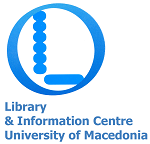
Filippos Kolovos, Software Systems Analyst & Engineer, Library & Info Centre, University of Macedonia
Filippos Kolovos, Software Systems Analyst & Engineer at the Library & Information Centre of the University of Macedonia outlines in this post the information systems used by the Library, outlines his experiences of migrating from commercial to open source code, shares his most challenging migration and its benefits for the Library and describes the toughest problem he has solved so far.
Q: Tell us about the information systems at your library
FK: The main role of the Library of the University of Macedonia is to be the Information Center of the University and as such, it is comprised of many information systems. First and foremost we have the Integrated Library System, based on the open source software of KOHA (v. 3.20.10) which is responsible for the management of the Library’s everyday tasks. These include the cataloguing and circulation of the material, the public catalog and the patron management (patron categories, rights, fines, etc).
Secondly, we have the subset of information systems for the management of the Library’s digital assets. It is comprised of Psepheda, which is based on the open source software of DSpace, v. 5.4 and is the Library’s digital repository. It hosts the University’s gray literature (mainly master and doctoral theses), digital material for the students with sight disabilities and other digital material, such as the historical library of economic and political science, the University’s guides and other publications, sectoral studies, etc. Some of the material is publicly accessible, but some other is only available from within the Library.
Another member of the Digital Library management software group is the Scientific Repository of the University, RUOMO, which is based on the open source software of E-Prints. It is scheduled to hold mainly the scientific work of the academic and research staff of the University, such as their journal publications, conference proceedings articles and other scientific contributions.
The Library also has a separate system for the management of the University’s digital journals. The official name of the system is “Administration and Publication of Digital Journals Support Service” and is based on the open source software PKP Open Journal Systems. It currently hosts ten digital journals published by the University. One major goal of the service is in the future to hold additional journals published that will be easily administered by the faculty members of the University.
There is also an open source system that manages the public computers of the Library. It is based on the Linux Terminal Server Project (LTSP), which actually provides central management and access for a set of public computers to the Library services and to the Internet. The best part of this project is that the replacement of a failed computer has become very easy, since it does not require the PC to have a disk installed, but simply to be able to connect to the network. The rest is up to the server to provide over the network, including the operating system.
Finally we operate several systems which mainly play an informative role. Among them is the University of Macedonia Catalog plus (UoMCat) system, which is based on the open source package VuFind and is basically a meta-search engine able to provide search results from many information sources, including the Library’s catalog and the digital repositories. Then we have the e-question helpdesk system for the Library’s patrons, a software developed from scratch and maintained by the Library, the Library’s database portal, which is an older system based on the open source package of Scout Portal toolkit and the Web Site based on the Joomla! Content Management System.
Q: What are your experiences of migrating from commercial to open source code?
FK: Difficult ones. Because on one hand we, system administrators, have the difficult role to migrate the data that resides in the commercial system and most often is in a totally different database schema than the system that is being moved into. On the other hand, we have the software code that has to be adjusted and customized to work and serve the needs of the Library at least as good as the previous system did.
Furthermore, we also face the lack of official support. This, in many cases does not seem to be a very serious problem, since many open source software systems are supported by large communities, which as an added benefit also provide several software plug-ins that extend the capabilities of the package. But even then, there are some times where for a problem there are many incomplete or in a large sense “ad-hoc” solutions, or there is not any solution available and you have to either complete one of the proposed or provide one, which can occupy many man-hours.
Furthermore, there are cases where an open source software package might not have a community at all, but just be provided “as is”, including the software packages that are developed from scratch and maintained by the Library itself. In that case we have to provide all the customizations, expansions and code debugging, which as a task is as challenging and difficult as it is educational and innovative.
All in all, my overall impression from all the migrations is that they are worthwhile. Most of the time you end up with good quality software, accompanied by a good supporting community and you get to have a say in the official software development of the project, since you are also a member of the software’s community support from the minute you install and start using it.
Q: What were the most challenging migration and its benefits for your library?
FK: The most challenging migration was actually a recent one, involving the migration from the Library’s commercial Integrated Library System (ILS) Dynix Horizon to the open source ILS Koha. We had several issues, as it was expected, due to differences between the database schemas, erroneous existing data in the commercial ILS which hindered the migration process, differences in the graphical user interfaces, etc.
One of the most challenging issues however, was for the Library staff to come in terms with the new working environment of the system. Differences in the “way of doing things” that the staff was accustomed to do in certain ways previously, proved to be a difficult matter to get used to. Even almost one year after the system’s official startup, there are issues for example where the staff cannot find one functionality from the old system in the new and most often it is reported as “absent”, even though it exists, but it is carried out in a different way.
The lack of official support is also an issue. Although we currently are under official support from BibLibre as a contract term for the installation of the software, the Library’s IT department will have to sort out every issue that will occur in the future, including the package’s software updates. Concerning the importance of the services it provides, it is very critical to minimize the system’s downtime and take every precaution necessary when updating or upgrading its codebase to avoid any unplanned problems and situations that would otherwise result in a crippled software. This task can be very challenging, since many of the problems might arise after some time of production usage of the system after the implementation of any upgrades and / or changes to the software code. We just hope to be innovative and careful enough so that such situations will have a minimum effect.
Q: What was the toughest problem that you have ever solved?
FK: Well, it is not easy to pinpoint one. Throughout the years, there were several tough problems to solve that comprise a big one: “Maintaining and supporting a set of different open source software packages, in different software platforms and for many users with differing and various needs”. This is a problem that is getting tougher and tougher as the technology and the user needs for better service advance together.
However, if I could select one as being a little more difficult, it would be the one when I had to implement the new virtualization infrastructure that would host all of the Library’s services. This involved at first ordering the new set of powerful servers, with the right technical specifications and installing them to the rack in the computer room. This task took some considerable time. Secondly, it involved a high amount of personal training, which took almost two months, in order to be able to “connect” the set of virtualization servers to a cluster, with the proper operating system, so that they would work together and take over one another’s tasks in case of a system failure.
The task also involved the creation of new virtual servers and the transfer of existing ones residing in physical servers to the virtualization infrastructure, where the latter had to be accomplished with the minimum downtime. Among the servers transferred were the Library’s Domain Controllers, the file server, the LTSP server, the digital repository PSEPHEDA, etc. The added difficulty in this case was to adjust the transferring system so that it will know that from now on it will be hosted as a virtual and not a physical server, an issue that involved a lot of practice and work.
New servers included the Library’s new ILS based on KOHA, the platforms for the scientific journal management OJS, the scientific repository RUOMO, the meta-search engine tool UOMCat Plus, etc.
About Filippos Kolovos
Filippos works as a system and network administrator at the Automation and Networking department of the Library of University of Macedonia since 2006. He holds a degree in the field of computer science from the department of Applied Informatics of the University of Macedonia and a Master’s Degree in Data Communications from the University of Sheffield, UK. Among his responsibilities are the administration of the digital services and the technical support of the technical and network equipment of the Library and also the improvement, customization and the creation of new digital services for the Library’s end users
You can further connect with Filippos on LinkedIn or reach him via e-mail.
The Library and Information Centre of University of Macedonia is a modern academic library which aims to offer essential educational and reference work, responding to the demands of a dynamically arising academic institute, such as the University of Macedonia.
With the University Senate’s no. 13/28/6/01 decision, which approved its internal operation regulation, the Library continued its operation as Library and Information Service (L.I.S.), in the level of Management. With the article 16 of the regulatory law on University and Technological Sector in Higher Education, the LIS is renamed Library and Information Center. The Library and Information Center includes 7 organic Departments. Setting as its’ prior objective to offer a range of services, emphasizing to the electronic and distant services, the Library and Information Centre of the University of Macedonia breaks down it’s natural borders adopting the new technological evolutions and filling its’ Departments with specialized staff.
Connect with the Library & Information Centre of the University of Macedonia on LinkedIn, become a Friend on Facebook, Pin on Pinterest or watch on YouTube.






